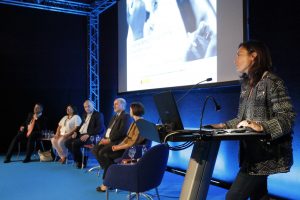Bilbao, September 30th 2016.- Small biotech companies and start-ups, R&D centers and pharmaceutical companies have highlighted the benefits that the Farma-Biotech program has generated for their activities. The Program was set up five years ago by Farmaindustria, and a summary of its recent activities was presented today in Bilbao in the context of the Biospain fair.
The initiative, which fosters the cooperation of the pharmaceutical industry with small biotechnology companies, universities, hospitals and R&D centers, largely bases its success on its projects selection criteria: therapeutic area of innovation, product type, innovative action mechanism, degree of differentiation to other developments or products, phase of advance in the development of medicine and status of industrial protection.
Farmaindustria’s Innovative Medicines Platform Manager, Amelia Martín Uranga, remarked during the gathering that, Farma-Biotech “is an original program, with a good selection process and an adequate format; it is also necessary, since it contributes to the development of the pharmaceutical innovation ecosystem, and it is forever focusing on a continued improvement process with the aim of increasing public-private collaboration and raise the international visibility of Spanish capacities in this field”.
Farma-Biotech’s operation mechanism is simple. Farmaindustria’s working team searches, receives and analyzes numerous in-development projects each year, coming both from Spanish small biotechnological companies, as well as from research centers and private and public hospitals. Between 2011 and 2015, 14 cooperation working days were called for, gathering together companies and promoters, in which 102 selected projects were presented amongst 412 received proposals.
Five projects already available on the market
From the 102 presented projects celebrated in different sessions, 63 of them still remain active. From them, 12 are already in clinical trials and five are available on the market. The next working day, which will mark its fifteenth edition, will be held in Madrid on November 15th, and 8 new projects of advanced research will be presented, amongst 54 proposals received during the first semester of 2016.
María Aguirre, Research and Innovation Director of the Basque Country’s Government, remarked during her speech in Bilbao the importance of these kinds of programmes to facilitate public-private collaboration in the field of biomedical R&D. Amongst the objectives of the Euskadi’s 2020 Strategy in Health Research and Innovation, we find it important the “increasing the collaboration with companies and technological and scientific agents, in order to turn the system into a partner of choice”, as well as “fostering the development of innovations, with the healthcare system as a traction element”.
Javier García Cogorro, CEO of the company Bioncotech, described the aspects regarding the development of products which are more important to a biotech Enterprise: the engagement with regulators, the role of investors and elements related to business development which should be planned from the beginning. On the other hand, he informed that Bioncotech has already recruited its first patient for the clinical trial of their first medicine.
Anabel Sanz, Transfer Technology Director at the Spanish National Oncologic Research Center (CNIO), explained the experience of this institution with regards to Farma-Biotech, in which they participate from the early editions, and remarked her interest in the collaboration strategy with the Severo Ochoa centers of excellence recently set up by Farmaindustria.
From the pharmaceutical industry’s side, Andrés G. Fernández, Director of Ferrer Advanced Biotherapeutics, concluded that Farma-Biotech is particularly useful to Spanish companies because of the proximity of decision centers, the day to day relation with key people involved in the decision making process, the maturity of the projects as well as their simple monitoring and plausible financing. Fernández commented on the value of Farmaindustria’s initiative in having helped produced a complete and updated map of Spanish biomedical research, as well as best identifying sectors (both academia and biotech), and structuring their offer in line with appropriate priorities and criteria.
Antonio Gómez, business liaison of the Janssen Cilag Research Centers, explained how the biggest limitation affecting medicine development between basic and applied science is called the ‘Valley of the dead’, since “the projects that stem from academia have not the required degree of maturity that industry demands”, so they need the latter to gain the technical and financial support to reach said maturity”. According to Gómez, the Farma-Biotech facilitates walking through said Valley with the application of the appropriate selection criteria, increasing the guarantees of de-risking. Taking all actions needed in order to carry out a less risky project or one less likely to unleash an economic loss.

 | We innovate for people
| We innovate for people

